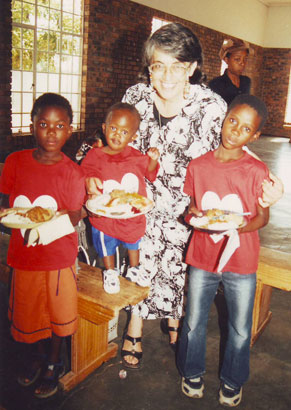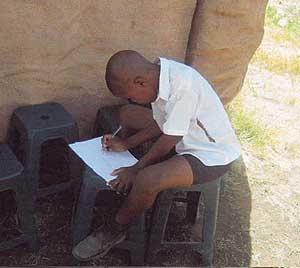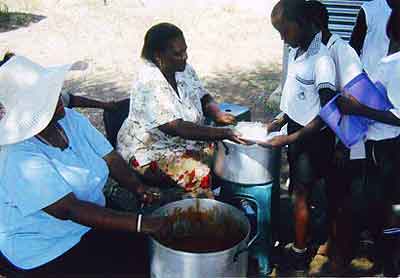The scourge of HIV/AIDS with all its ramifications in Sub-Saharan Africa is well known throughout the world: South Africa, unfortunately, having the highest infection rate, an alarmingly high death rate and an ever increasing number of orphans – innocent and helpless victims of the epidemic.
In the early days of the disease, President Mbeki and the Minister of Health maintained a negative attitude refusing to acknowledge the seriousness of the problem or the need for extraordinary intervention on the part of the government. This state of denial resulted in the rapid spread of the disease. The work of combating HIV/AIDS fell to NGOs and Faith-based organisations. The Catholic Church is recognised as making the greatest contribution to campaigns to prevent infection, provide home-based care for sufferers, give counselling to those affected in any way and look after orphans.
Government has lately initiated a programme to deal with HIV/AIDS but it is far from adequate and rarely reaches remote rural areas. In recent times awareness has grown of the large number of orphans, many of whom are HIV positive, and the challenge they present to society as a whole. These innocent children find themselves abandoned and unable to understand what has happened to them. HIV/AIDS still carries a stigma and in many communities is not talked about.
The more fortunate of the children are taken in by grandparents or extended family members: the less fortunate have to care for themselves and for one another. It is not uncommon to find a ‘family’ where the head of the house is in his/her teens or younger. The results of this situation are frightening: how can these children cope with poverty, trauma, fear of the future, fear of unscrupulous adults who prey on their vulnerability and the constant demands of daily living?
 Sr. Christine & some children made orphans by AIDS
Sr. Christine & some children made orphans by AIDS
In 2003 the Sisters of Mercy decided to do something positive about the orphans in their area. Sister Christine Jacob established the Kopano-Lerato (Unity with love) club, made up of orphans in their teens. The aims of the club include:
- to protect children’s rights
- to integrate the children into the communities in which they live
- to alleviate poverty
- to give children hope for the future and find a dream to follow
- to teach them to take responsibility for their lives
The young people are supported by an auxiliary social worker and five child care workers. All of the members are given opportunities to attend courses to help them grow as individuals and enable them to assist others in an appropriate way.
The club members visit each family weekly to provide material help as well as counselling and support as it is needed. They help with homework and ensure that all the children attend school regularly. Above all they strive to make the children aware of their own worth and dignity as human beings.
The monthly meeting on the last Saturday of each month is a major event in the lives of the orphans. All one hundred and seven of them (three quarters of them range between the ages of 7 and 18) come together to enjoy a day of games, special meals and an opportunity to share their problems and hopes with their own age groups and receive encouragement and advice from a number of adults who have taken on the task of mentoring these young people from a distance. Birthdays and other special occasions are also appropriately celebrated.
A special feature of this project is the attention given to the guardians/foster parents of the children. They have meetings at which they can share their views, joys, hopes and difficulties. A social worker advises them on matters related to parenting. She also facilitates their dealings with government departments. They are encouraged to develop income-generating skills which will make them more independent.
The Mmakau project started in 2004 and is more limited in its scope. Fifty five orphans are given a meal every day: probably the only one they have. On one occasion one of the carers noticed that some of the children were not eating the full meal. On enquiring, she discovered that they had younger brothers and sisters at home who had nothing to eat: they were saving the little they had to share with these. The carer’s now ensure that all are catered for.
A parent/guardian support group has been formed to give further help to the orphans. Already they have had talks on healthy living, how to take responsibility, their rights as children and as citizens. During the school holidays programmes are organised to make their lives more meaningful. During the recent long summer holidays they had a course in art and drawing, floral arranging and various ways of decorating their surroundings.
Every month there is a party to celebrate birthdays occurring during that period. The orphans from Mmakau also join those from Winterveldt on outings which are arranged on a regular basis. As in Winterveldt the aim is to bring the children to an awareness of their importance as human beings, their right to respect and the opportunity to develop as responsible citizens of their country.
These efforts reach a relatively small number of children in need but we hope that as time goes on we will be able to extend our work: this hope is based on the fact that the local communities are becoming more and more involved and are taking ownership of the projects. We are also grateful to the many donors whose generosity makes everything happen. In all the goings-on we see a practical demonstration of Christianity which would surely have Catherine’s approval.
Immaculata Devine rsm
South African Province




